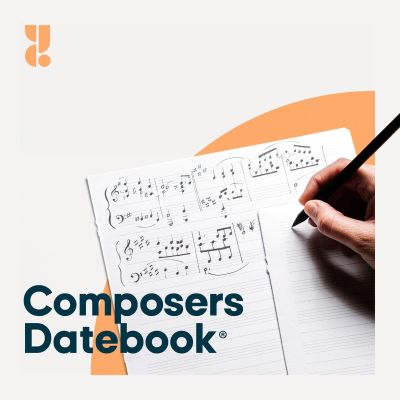Composers Datebook™ is a daily two-minute program designed to inform, engage, and entertain listeners with timely information about composers of the past and present. Each program notes significant or intriguing musical events involving composers of the past and present, with appropriate and accessible music related to each.
Pleyel and Poulenc
Synopsis
Pleyel and Company was a French piano firm founded in 1807 by the composer Ignace Pleyel. The firm provided pianos for Chopin, and ran an intimate Parisian 300-seat concert hall called the Salle Pleyel–the “Pleyel room” in English, where Chopin once performed.
In the 20th century, a roomier Salle Pleyel comprising some 3,000-seats was built, and it was there on today’s date in 1929 that a new concerto for an old instrument had its premiere performance. This was the “Concert champetre” or “Pastoral Concerto” for harpsichord and orchestra by the French composer Francis Poulenc, with the Paris Symphony conducted by Pierre Monteux, and with Wanda Landowska as the soloist.
“A harpsichord concerto in a hall that seats thousands?” you may ask. “How could anyone hear the harpsichord?” Well, the answer is that Madame Landowska performed on a beefier, metal-framed harpsichord built in the 20th century rather than the quieter wood-framed instruments used in the 18th. Landowska’s modern harpsichord was specially-constructed for her by–who else?–Pleyel and Company.
Landowska needed those extra decibels because Poulenc’s concerto was scored for harpsichord and a large modern orchestra, with winds, percussion, and a large brass section that even included a tuba!
Music Played in Today's ProgramFrancis Poulenc (1899-1963) Concert champêtre/Pastoral Concerto Aimée Van de Wiele, hc; Paris Conservatory Orchestra; Georges Prêtre, cond. EMI Classics 69446 or 95584
On This Day Births1886 - French organist and composer Marcel Dupré, in Rouen;
1920 - American composer and jazz pianist John Lewis, in LaGrange, Ill.;
1704 - Austrian composer Heinrich Biber, age 59, in Salzburg;
1831 - Hérold: "Zampa," at the Opéra-Comique in Paris;
1893 - Horatio Parker: oratorio "Hora Novissima," in New York City;
1917 - Bloch: "Schlemo" and "Israel" Symphony at Society of the Friends of Music Concert, Artur Bodanzky conducting;
1919 - Debussy: Clarinet Rhapsody (orchestral version), in Paris, with clarinetist Gaston Hamelin, at Pasdeloup Concert;
1929 - Poulenc: "Concert champêtre" for harpsichord and orchestra, at the Salle Pleyel in Paris, by the Paris Symphony with Pierre Monteux conducting and Wanda Landowska the soloist;
1934 - Bernard Rogers: "Three Japanese Dances," in Rochester, N.Y.;
1943 - Cowell: "American Melting Pot" (Set for Chamber Orchestra), at Carnegie Hall in New York, by the Orchestrette of New York, Frédérique Petrides conducting;
1952 - Vaughan Williams: "Romance" for harmonica and orchestra, in New York City;
1958 - Walter Hartley: Concerto for 23 Winds, at the Eastman School in Rochester, N.Y., by the Eastman Wind Ensemble, Frederick Fennell conducting;
1963 - Cowell: Quartet for Flute, Oboe, Cello and Harp, at the University of Miami, by John Bitter (flute), Julien Balogh (oboe), Hermann Busch (cello), and Mary Spalding (Mrs. Fabien) Sevitzky (harp); The work is dedicated to the conductor Fabien Sevitzky "in honor of his many services to American music";
1969 - Shostakovich: Violin Sonata, in Moscow, with David Oistrakh and Sviatoslav Richter;
1989 - James MacMillan: "Visions of a November Spring" for string quartet, at University Concert Hall in Glasgowm Scotland, by the Bingham String Quartet;
1971 - Debut broadcast of National Public Radio's "All Things Considered" with an electronic theme by composer Don Voegeli of the University of Wisconsin (In 1974, Voegeli composed a new electronic ATC theme, the now-familiar signature tune of the program).
